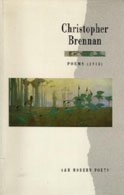 | Poems 1913 Christopher Brennan 1913 |
All previous entries in this Classic Year (bar, I suppose, the Mary Gilmore poem) have been distinctly "Australian" in their subject matter: tales of bushrangers, convicts, horsemen, and outback men and women. "Lilith" by Christopher Brennan takes a completely different path.
Christopher Brennan was born in 1870, only three years after Henry Lawson, and yet the two poets could not be more dissimilar in their work, and yet so similiar in their lives. Brennan's major sphere of influence was Europe and his work links more to that romantic, classical tradition than to the existing Australian style of his time. His poem "Lilith" is a perfect example of that. Heavy with symbolism, references to religion, mythology, and folk tales, it could only have been written by someone steeped in the European tradition.
The Wikipedia entry on Lilith describes her as: "Lilith is a mythological female Mesopotamian storm demon associated with wind and was thought to be a bearer of disease, illness, and death. The figure of Lilith first appeared in a class of wind and storm demons or spirits as Lilitu, in Sumer, circa 3000 BC. Many scholars place the origin of the phonetic name 'Lilith' at somewhere around 700 BC. Lilith appears as a night demon in Jewish lore and as a screech owl in the King James version of the Bible. She is also apocryphally the first wife of Adam." Lilith is the succubus, the seducer and captor of men, and Brennan's poem can be read from any number of angles: he is writing of all women as Lilith, or only one. Either of these will fit and that leads you to conclude that the poem is either sublime
because it allows for multiple interpretions, or incomprehensible for the very same reason.
Of the poem, Judith Wright, in 1965, wrote: "If some of Brennan's assurance had left him meanwhile, and he had begun to doubt the possibility of human achievement of the goal of complete consciousness, it may have been the encounter and wrestle with his Lilith-figure that had caused the change. She so much dominates the poem, and is so presented, as to leave us with a deep doubt that Adam can ever grow to her stature -- as he must do if he is to find his way beyond her. She represents Brennan's deepest exploration into his own psyche, and into the concepts of death, eternity, and evil; at the same time she must stand for the eternal allure of the unknown, of the feminine, of the maternal, of the abyss of the past and the undiscernible distance of the future. To embody all this, and more, in one figure was task enough to exhaust the vision and invention of any poet, and leave him doubtful of human ability and achievement." And I'll bow to her greater understanding of this work.
Notes: Full text of the poem (PDF file)
Australian Dictionary of Biography entry
Wikipedia entry
Photo of Christopher Brennan
Dante Gabriel Rossetti's sonnet "Lilith" (just 'cos I'm a Pre-Raphaelite fan)
The next four works in this Classic Year:
10. Seven Little Australians by Ethel Turner (1894)
11. The Getting of Wisdom by Henry Handel Richardson (1910)
12. "The Gentle Water-Bird" by John Shaw Neilson (1927)
13. My Brilliant Career by Miles Franklin (1901)
